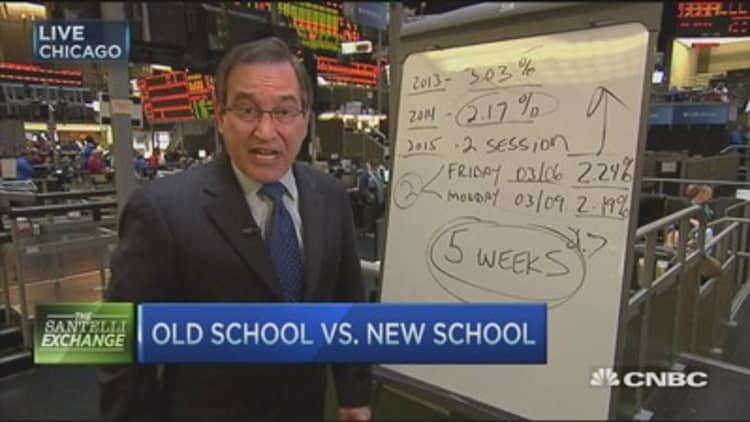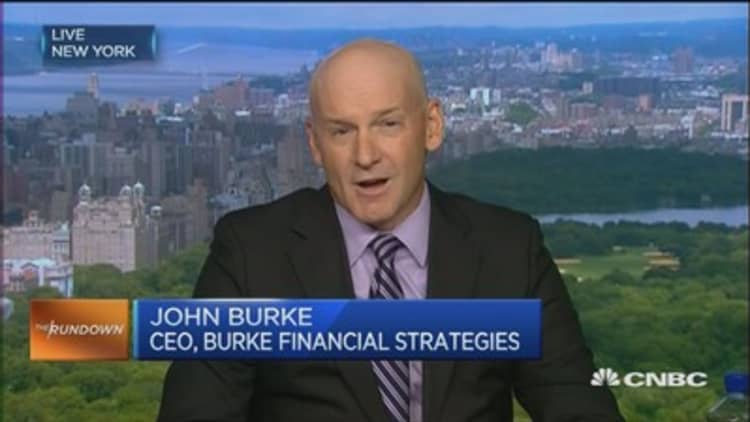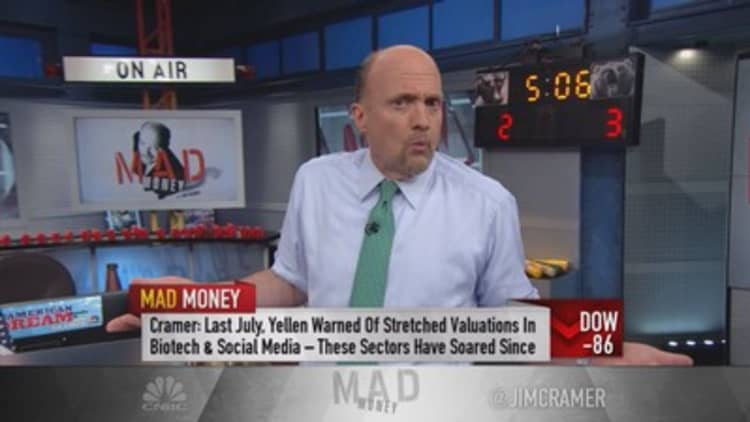



The increasingly uncomfortable rise in interest rates could have a strong hold on stocks Thursday, as traders await Friday's jobs report.
Unemployment claims are the key data for markets Thursday, after they hit a 15-year low in the week earlier. Economists expect to see 275,000 first-time claims, up from 262,000 in the previous period, which is still a number that points to a healthy labor market.
Traders say some views for a big rebound in Friday's April nonfarm payrolls soured after Wednesday's ADP report showed just 169,000 private sector payrolls. But there was not a downshifting in Wall Street forecasts for Friday's nonfarm payrolls. Economists expect 224,000 jobs, up from 126,000 in March according to Thomson Reuters.
Stocks slumped Wednesday and selling accelerated in the afternoon as the 10-year yield edged to 2.25 percent, a more than two-month high, and well above Friday's 2.11 percent level.
The April jobs report comes as economists have just written off first-quarter growth and estimate that GDP contracted by a consensus forecast of 0.4 percent. Fridays' jobs report is the first major data point for the second quarter, and traders will be watching both for what it says about growth and as a metric that could influence the Fed's timing on a rate hike. As of now, market expectations are for the first rise in September or later.
The closed above its lows Wednesday, but was off 0.4 percent to 2,080, and the Nasdaq also slipped 0.4 percent to 4,919.
"There's a lot of uncertainty around rates. Now the disappointing growth in Q1, that's creating more uncertainty and obviously that will create some choppiness. All the broad macro trades have not worked out in the last few days. People are short oil, that's not working. People are long dollar, that's not working," said Venu Krishna, head of equity linked and small-cap strategy at Barclays.
He said small caps too wiped out their year gains last week and are lower this week, but he still expects them outperform later this year.
Read More US 1Q productivity fell 1.9 percent vs. 1.8 percent drop expected
"The big variable will be if the U.S. economy falters. Then small caps will continue to falter. The very act that has allowed them to benefit—greater balance sheet leverage and greater capital spending—will also hurt t hem if things get slow," Krishna said.
Treasury yields, particularly at the long end, have been following a move higher in European sovereign yields, led by the German bund. A heavy calendar of U.S. corporate issuance has also drawn funds from Treasurys, as investors move into corporate credits, like Wednesday's $8 billion Apple deal.
Small caps had been underperformers in recent sessions, but large caps were the bigger losers Thursday. The Russell was actually positive, up 0.3 percent at 1,219.
Read More
Markets also took as negative a comment Wednesday from Fed Chair Janet Yellen that equities are overvalued, but traders said the markets were far more impacted by the wave of selling in Europe.
"You're seeing unwinds. The dollar's down, and Treasurys are down. You can't blame weak economic data because if that's why—then the dollar is down and Treasury yields are up. You have all these European sovereigns selling off," said Michael O'Rourke, chief market strategist at JonesTrading. The dollar also fell as the euro bounced above $1.13.
The selling in stocks was led by dividend payers and interest rate sensitive stocks. Telecom was the worst performer Wednesday, and utilities were second in line. The best-performing group was consumer staples, followed by materials and energy. The energy and equipment subsector gained more than 1 percent, as U.S. oil futures prices rose to close above $60 a barrel for a second day.
Read More Traders ignore Yellen warning, not a 'good investor'
BlackRock's Jeffrey Rosenberg said the turning point for European yields came when European Central Bank President Mario Draghi signaled there would be no further cut to the deposit rate, and stronger European economic data supported his comments, on curbing further easing. The ECB also has a quantitative easing bond-buying program.
"What was built into a lot of the expectations was that at some point they'd expand it," said Rosenberg, chief investment strategist for fixed income. Traders had expected the 10-year German bund yield to turn negative, but instead it began to zip higher, dragging U.S. rates with it.
Also behind the idea of further ECB easing was the fact that inflation expectations were low, but a reversal in oil and other commodities is changing that view.
"I think the simplest explanation is that we got to an inflection point in European rates. We had seen an inflection point in Japanese rates. Some of the reasons for that were some of the fundamental shifts we were seeing in the economic backdrop, and the environment that led to a lot of the low global yield phenomena was low economic growth, years of low inflation and the view that central banks needed to do more policy intervention," he said. Rosenberg said that view was so widespread it helped to drive yields to extreme lows and even negative levels.
Read More US private sector adds 169,000 jobs in April: ADP
The U.S. jobs report Friday will be key for informing markets on the Fed, moving toward tightening while other central banks stay easy. If the jobs report is strong, it could support the rise in yields, though they have already advanced a considerable amount. Rosenberg also said the market will key in on average hourly wages, since wage inflation is a factor that could influence the Fed to move on interest rates.
Rosenberg said if the wage gains in Friday's employment report are stronger than expected, that could impact shorter-duration Treasurys. "I think wage inflation is much more about changing timing of Fed liftoff, and so that I think that impacts the front end of the curve," he said.
Rosenberg is not altering his rates forecast. "We have a year-end forecast at 2.50 (for the 10-year), and I'm going to leave it there. it's a pretty big move and it a pretty short period of time," he said.
Read More This is a huge warning for stocks: Trader
Besides claims, there are dozens of early morning earnings including Alibaba, Siemens, Nintendo, Apache, ArcelorMittal, Regeneron, Kate Spade, Fortress investment, Sarepta Therapeutics, Alcatel-Lucent, Time Inc, Teradata, Windstream and Seaworld. CBS, Monster Beverage, Nuance Communications, Cyber Ark Software, Great Plains Energy, Mohawk and Outerwall report after the bell.
Read More Market not overvalued: Money manager
Chicago Fed President Charles Evans will appear with on "Squawk Box" at 8:30 a.m. ET, and former Treasury Secretary Tim Geithner will be on at 7:30 a.m.
The U.K. general election is Thursday, and polls suggest incumbent Prime Minister David Cameron, head of the Conservative Party, is neck and neck with opposition Labour leader Ed Miliband.
If neither party gains a majority of the 650 seats up for grabs, a "hung parliament" occurs, and there would be negotiations for a coalition.
CORRECTION: On May 6, the 10-year yield edged to 2.25 percent, a more than two-month high. That fact was misstated in an earlier version of this article.


